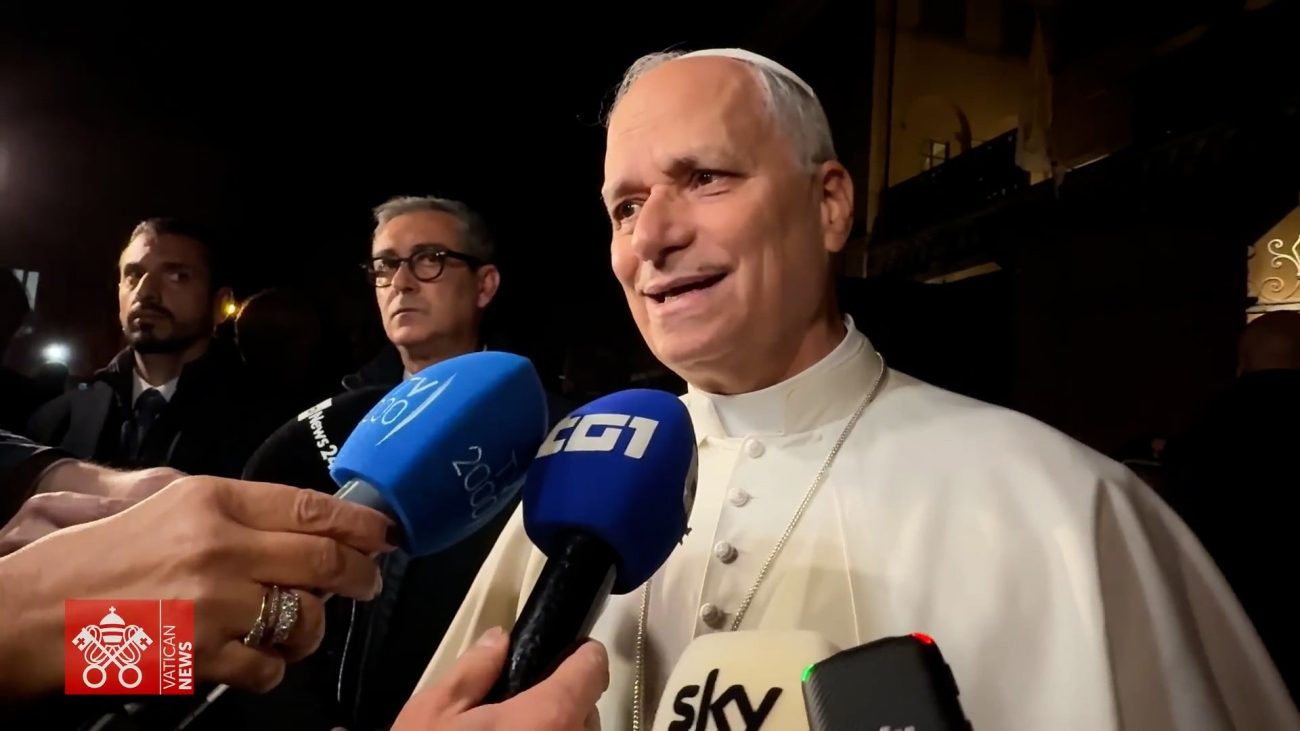VATICAN CITY (CNS) — Catholics in immigration detention centers have “spiritual rights” that Catholic clergy should be allowed to serve, Pope Leo XIV said.
Speaking briefly with reporters late Nov. 4 outside his residence in Castel Gandolfo, Pope Leo was asked about a detention facility in Chicago denying access Nov. 1 to an auxiliary bishop and a delegation of clergy, religious sisters and laity, who wanted to bring Communion to Catholics detained there.
The pope was also asked about the increasing tensions between the United States and Venezuela and about the case of Father Marko Rupnik, an artist accused of multiple cases of abuse.
On the question of the Chicago detention facility, Pope Leo prefaced his remarks by noting how, at his Mass at a Rome cemetery Nov. 1, the Gospel reading was from Matthew 25 with its litany of feeding the hungry, welcoming the stranger and clothing the naked. The Lord says, “Whatever you did for one of these least brothers of mine, you did for me.”
“Jesus says very clearly that at the end of the world, we’re going to be asked, you know, ‘How did you receive the foreigner? Did you receive him and welcome him or not?’ And I think that there’s a deep reflection that needs to be made in terms of what’s happening” with how immigrants in the United States are being treated today, the pope said.
“Many people who’ve lived (in the United States) for years and years and years, never causing problems, have been deeply affected by what’s going on right now,” he added.
Pope Leo said he would like to ask “the authorities to allow pastoral workers to attend to the needs of those people. Many times they’ve been separated from their families for a good amount of time; no one knows what’s happening, but their own spiritual needs should be attended to.”
Tricia McLaughlin, assistant secretary for public affairs for the Department of Homeland Security, said in a statement to OSVNews that the Broadview facility in Chicago is “a field office, it is not a detention facility.”
“Illegal aliens are only briefly held there for processing before being transferred to a detention facility. Religious organizations are more than welcome to provide services to detainees in ICE detention facilities,” McLaughlin said, but not at field offices where “detainees are continuously brought in, processed, and transferred out.”
Pope Leo also was asked what he thought about the United States sending warships to the Caribbean, particularly off the coast of Venezuela. President Donald Trump has said the deployment is part of his effort to stop drug traffickers.
“A country has the right to have a military to defend peace, to build peace,” the pope said. “But in this case, it seems a bit different — tensions are rising. Just five minutes ago, I read some news saying that they’re getting closer and closer to the coast of Venezuela.”
“I think that with violence, we don’t win,” the pope said. “The important thing is to seek dialogue, to try in a fair way to find solutions to the problems that may exist in any country.”
The last question the pope took before driving back to the Vatican regarded requests by the alleged victims of Father Rupnik to have his mosaics covered up or removed from churches around the world, something the pope noted had been occurring.
The priest, an artist and former Jesuit, has been accused of sexually, spiritually and psychologically abusing more than 20 women — many of them members of a religious community he co-founded — over a span of four decades.
The Dicastery for the Doctrine of the Faith announced in early October that it had appointed judges to form the tribunal for the priest’s canonical trial.
“I know it’s very difficult for the victims to ask that they be patient, but the church needs to respect the rights of all people,” the pope told reporters. “The principle of innocent until proven guilty is also true in the church and hopefully this trial that is just beginning will be able to give some clarity and justice to all those involved.”
Earlier in the day, journalists had asked Cardinal Víctor Manuel Fernández, prefect of the doctrinal dicastery, about the status of the trial and when it might conclude.
“They are working,” he said. “They are working independently” so he could not provide details about whether they had begun listening to witnesses or how long the trial might take.
The dicastery had said in October that “the panel of judges is composed of women and clerics who are not members of the Dicastery for the Doctrine of the Faith and who hold no office within any of the dicasteries of the Roman Curia.”
“This has been done in order to better ensure, as in every judicial proceeding, the autonomy and independence of the aforesaid tribunal,” it said.
PREVIOUS: Mary, Mother of Jesus and All Believers, is Not Co-Redeemer, Vatican Says
NEXT: Pope Welcomes Palestinian Leader; Discusses Gaza, Peace



Share this story